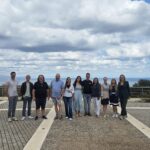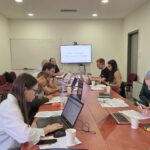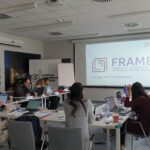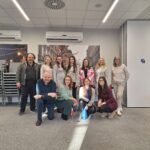AI-Powered Teaching Guidance for Educators
2024-1-DE01-KA220-HED-000254017
The Erasmus+ project aims to integrate Artificial Intelligence (AI) into higher education to develop innovative teaching methods and strengthen the skills of teachers and students. The aim is to create personalised, flexible and ethically responsible learning and teaching approaches that meet the demands of an increasingly digital educational world.
The desired outcomes include better integration of AI tools into higher education, the development of practical training modules for teachers, the creation of interactive educational resources such as videos and podcasts, as well as the development of guidelines for the ethical use of AI. There is a focus on collaboration between universities and AI experts to maximise the pedagogical possibilities of AI and better prepare future teachers for the classroom of the future.
The project is in line with the priority of driving digital transformation in higher education and supports the development of innovative approaches that promote sustainable modernisation of teaching. The project aims to make the learning experience at universities more engaging, effective and accessible.
The project started in December 2024 and will run for 30 months (12/2024 - 05/2027).
In addition to Johannes Gutenberg University Mainz, the partners involved in the project include the adult education centre PELICAN (Czech Republic), the social enterprise PRISM (Italy), the FRAME Foundation (Poland), the Technical University of Crete (Greece) and the Transilvania University of Brasov (Romania).
2nd Transnational Project Meeting in Chania, Greece (13-14 September 2025)
From 13th to 14th October 2025, the AI in Higher EDU project team met for its 2nd transnational project meeting (TPM) at our Greece partner, the Technical University of Crete (TUC) in Chania.
The Technical University of Crete (TUC) is a public university in Chania, Greece, established in 1977, known for its excellence in engineering, science, and technology education and research. Within this progressive environment, intensive work was conducted and fruitful discussions were held on the subsequent steps of the project.
The meeting focused on the next steps of the project:
- Sustainability Assessment and Customisation plan for AI Tools: The project team will assess the sustainability of selected AI Tools and create examples and roadmaps on how to implement these technologies in courses.
- Content Development: The partners will create brief video tutorials on the educational possibilities of selected AI Tools as well as more detailed written guides. The team discussed and agreed on suitable formats and requirements for these products.
All interested educators and teacher student teachers who would like to follow the projects outputs or have any questions, please send a message to ai-highereducation@zww.uni-mainz.de.


First Partner Meeting: 18 and 19 March 2025 in Łódź, Poland
The first transnational partner meeting of the AI in Higher EDU: AI-Powered Teaching Guidance for Educators project took place on 18th and 19th March 2025 in Łódź, Poland. The project partners from Poland, Greece, Romania, Italy, Germany and the Czech Republic met to discuss the project objectives and to discuss and agree on the first steps for producing the project results.
AI in Higher EDU aims to support the integration of artificial intelligence in higher education and equip lecturers with the necessary skills. To this end, training modules for lecturers, podcasts, webinars and an ethical guide will be developed.



